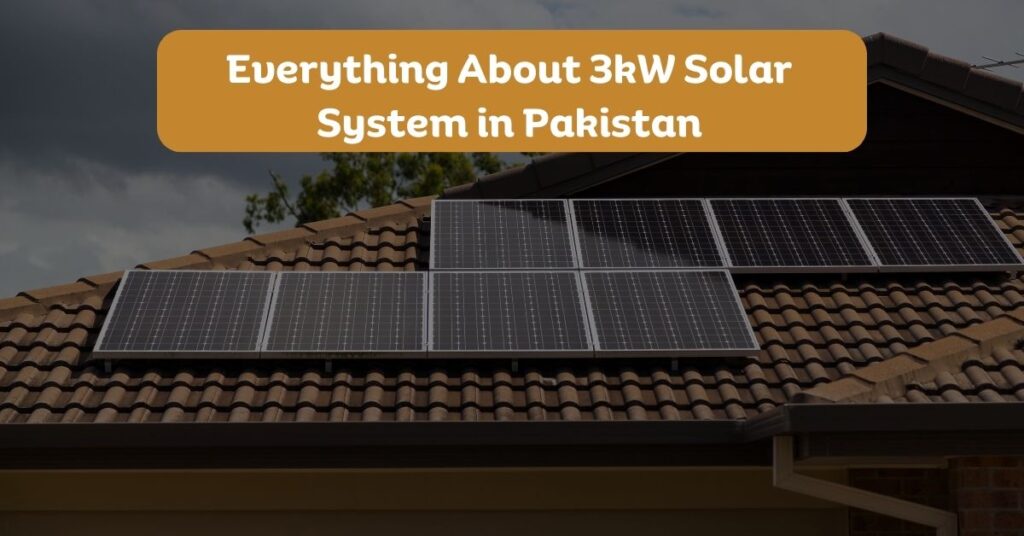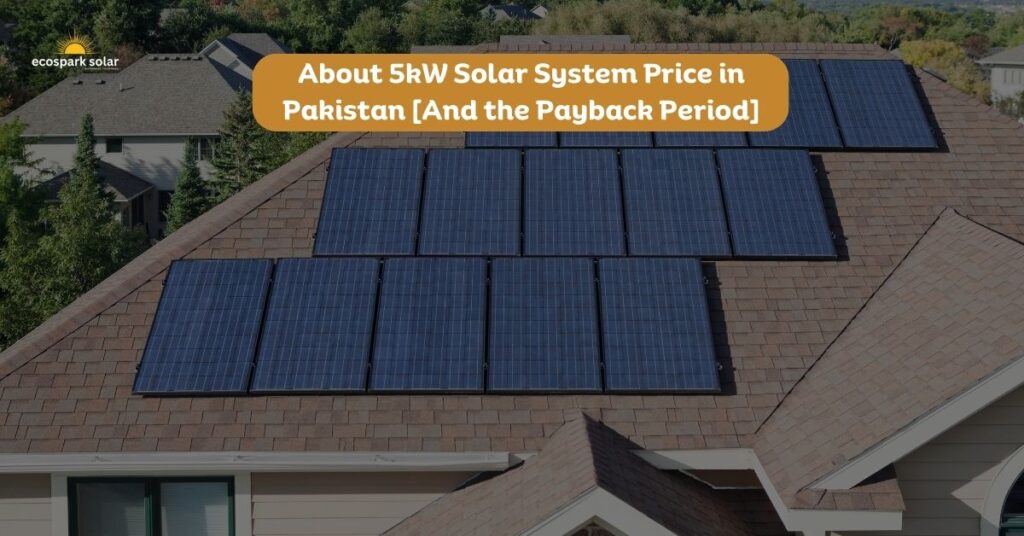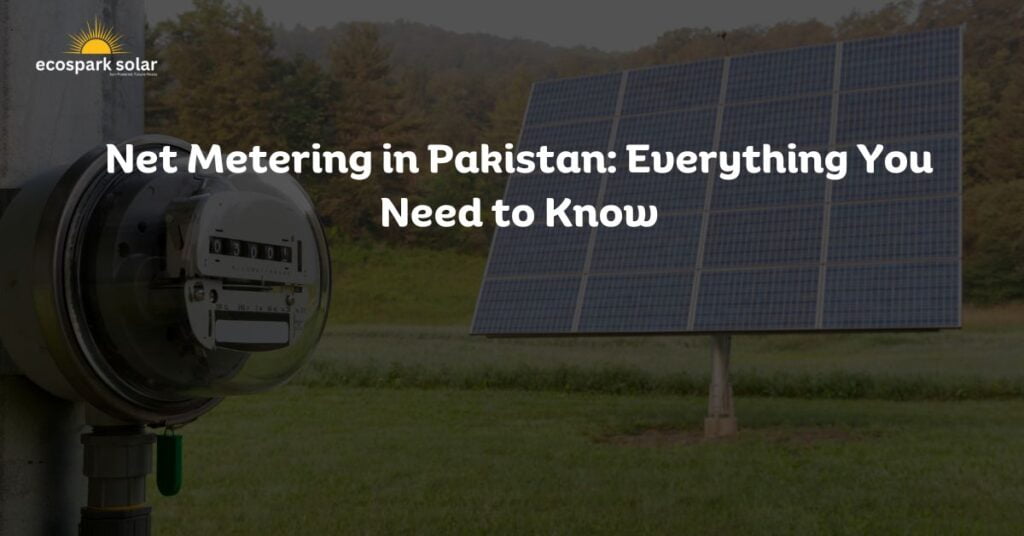Rooftops in Pakistan are turning blue—all thanks to the declining cost of solar power and increasing costs of electricity. If you have a medium-sized home or business, a 10kW solar system will be one of the options you may have on the table. It is because 10kW systems can not only power essential appliances but also keep your indoors cool during summer.
But how much does it cost? What’s the price of a 10kW solar system in Pakistan?
That’s what we will explore in today’s article. To be specific, we will cover the following:
- 10kW solar system price in Pakistan
- The average price of a 10kW on-grid solar system in Pakistan
- The price of a 10kW hybrid solar system in Pakistan
- The average price of a 10kW off-grid solar system in Pakistan
- Factors that affect the cost of 10kW solar systems
- The payback period of 10kW solar systems
- How many panels do you need for a 10kW solar system?
Note: You may hear people using kVA for systems, such as 10kVA solar system price in Pakistan, etc. However, the accurate unit for measuring the size is 10kW. A 10kW solar system may be 12.5kVA if the power factor is 0.8, or even more f the power factor is less. It is technical and you do not have to go into details. For common users, kW is a good unit. 10kW solar system means any system which have 10kW solar panels.
10kW Solar System Price in Pakistan
As of October 2024, the average price of a 10kW solar system in Pakistan ranges from PKR 1,1500,000 to 1,800,000. The price variation is influenced by the type of system, quality of components, location, and other factors. For example, an on-grid solar system requires only solar panels and an inverter, whereas a hybrid system will also include batteries for energy storage. Going for off-grid systems requires a larger battery bank to meet overall energy needs, making the initial cost high.
Let’s take a closer look at the average prices for each type of solar system. But before that, here is what the price of a solar system includes:
- Price of solar panels
- Price of solar inverters
- Price of mounting structures
- Earthing and civil works
- Net metering cost (for on-grid and hybrid systems)
- Hardware, transportation, installation, and commissioning
| Item | Total number of items required | Average Price | Total Price |
| Solar Panels | 18 solar panels required, each 580W | 18,000 per panel for one 580W panel | 324,000 |
| Inverter | 1 | 270,000 to 600,000 | 270,000 to 600,000 |
| Structure | 6 for standard structure, 1 for customized | 80,000 to 200,000 | 48,000 to 200,000 |
| Earthing and Civil Works | 1 | 50,000 to 70,000 | 50,000 to 70,000 |
| Net Metering | 1 | 100,000 to 120,000 | 100,000 to 120,000 |
| Hardware (Cables, pipes, breakers, switches, etc.) | As per job | 100,000 to 150,000 | 100,000 to 150,000 |
| Transportation | As per job | Case to case vary | |
| Installation and commissioning | As per job | 60,000 to 100,000 | 60,000 to 100,000 |
| After-sale service | 6 months complimentary | Additional time may cost you |
Average Price of 10kW On-Grid Solar System in Pakistan
The average cost of a 10kW on-grid solar system in Pakistan varies between PKR 1,1500,000 to 1,500,000, depending on factors like the brand of solar panels, inverters, mounting structures, and installation expenses. While lower-quality components might seem cost-effective initially, they may lead to performance issues and the need for replacements in the long run. The price difference is especially influenced the prices of inverters, as one 10kW inverter would cost Rs. 250,000 and another all the way going up to Rs. 600,000.
On-grid solar systems are directly connected to the national electricity grid, allowing homeowners to generate their electricity and even sell any surplus energy back to the grid through net metering. These systems are best for areas where there is no or very minimal load shedding. If you do not want net metering, you can substract around 100,000 from the overall cost. But note than an on-grid inverter doesn’t work without net metering. So, a hybrid system will be required. But how much does a 10kW hybrid solar system cost in Pakistan?
10kW Hybrid Solar System Price in Pakistan
For a 10kW hybrid solar system, you can expect to pay approximately PKR 1,500,000 to 1,80,000. These costs are inclusive of batteries and hybrid inverters as well as net metering. A 10kW hybrid system requires 48V of batteries. So, if you want to have lead-acid batteries, you will need 4 batteries. Conversely, one lithium-ion battery of 48V also works, though they are expensive compared to lead-acid batteries. Read what is the difference between lead-acid and lithium-ion batteries.
Hybrid systems offer the advantage of combining the features of on-grid and off-grid systems, enabling energy storage for later use. You can be connected to the grid and, at the same time, enjoy uninterrupted power when there is load shedding.
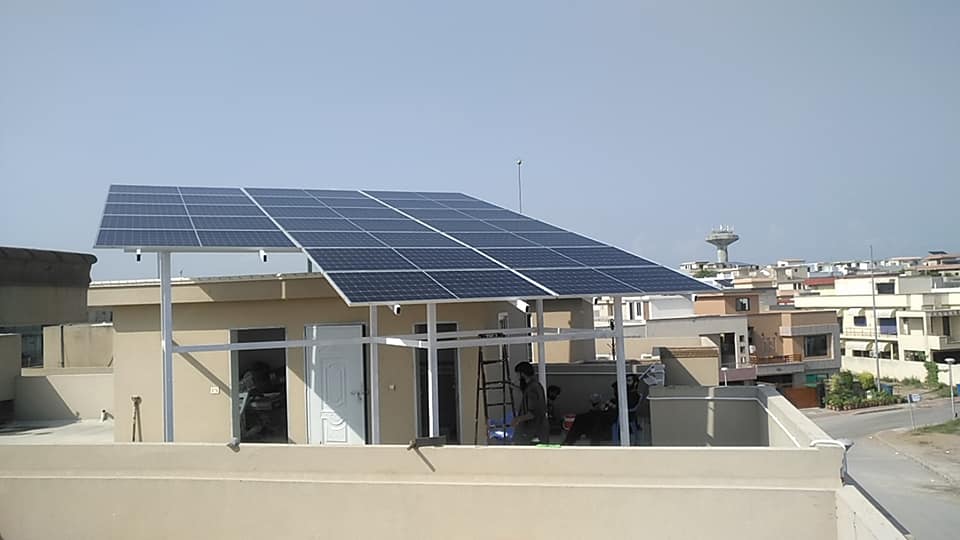
Average Price of 10kW Off-Grid Solar System in Pakistan
If you opt for a 10kW off-grid solar system, the average price ranges from PKR 12,000,000 to 1,800,000. This cost includes batteries, off-grid inverters, and specialized equipment required for standalone operation. Off-grid systems are suitable for areas with limited or no access to the national grid.
It’s important to note that these price ranges are subject to variation based on factors such as geographical location, local market conditions, installation complexity, and the quality of components used. For instance, while usually you would need 4 batteries (or one lithium-ion battery), if your load is high, you may increase the number of batteries. In that case, the two sets of batteries would be connected in parallel in a way that would count as 48V batteries. But that would make the system expensive.
Additionally, these are just estimates, and the exact cost at your location will be determined based on the applicable peak sun hours, your energy consumption patterns, existing prices of solar panels and inverters, and your goals.
A solar system for everyone.
We’re customer-centric; we will find you a solution within your budget. Whatever your project size, you can always save with Ecospark Solar.
| You May Like to Read: Comparing Solar Systems: On-Grid vs. Off-Grid vs Hybrid Solar |
Factors That Affect the Price of 10kW Solar System Installation
The cost of solar system installation can differ for various homeowners, even with similar specifications. Several factors contribute to these variations, some of which are given below:
Solar Panel Quality and Brand
First of all, the quality of solar panels. There are many types of solar panels based on brands and configurations. High-quality panels from reputable brands tend to be more expensive but offer far better efficiency of around 20%, longer warranties, and superior performance over the system’s lifespan. Conversely, second-grade panels are cheaper but not worth the size of a 10kW system. For instance, a Canadian N-type panel is a bit more expensive than JA solar panels. Similarly, a B-grade Canadian N-Type would cost less than an A-grade Canadian N-type.
Inverter Type and Capacity
Different types of inverters come with varying costs and performance levels. The inverter’s capacity should match the solar panel array for optimal energy conversion. There are too many inverters—both local and imported. In our experience, some local brands have shown better performance than imported ones. But mind that not all local inverters are better. Make sure that the inverter you choose has above 97% efficiency, is robust, and comes with at least 5+ years of warranty.
Location
What if I told you that not all 10kW systems produce the same amount of electricity? That’s true. The amount of power a solar system generates depends upon the solar irradiance in that region. In areas that receive more peak sun hours, a 10kW solar system can be assembled with fewer solar panels. That would cost less. On the other hand, in some areas where there are fewer sun hours, you would need more panels, and the cost would be high.
What is solar irradiance, and how it works? Read it in our article, where we have simplified peak sun hours in Pakistan for you.
Battery Storage (For Hybrid and Off-Grid Systems)
Opting for a hybrid or off-grid system with battery storage will increase the overall cost. Batteries allow you to store excess energy generated during sunny periods for later use. Some batteries, such as Li-ion, are more expensive than simple lead-acid batteries and would cost you more. Even in the lead-acid option, some batteries such as tubular batteries more expensive compared to simple lead-acid batteries.
Mounting Structure and Installation Complexity
The type of mounting structure used and the complexity of the installation site can impact the overall cost. If the roof is flat, the mounting structure would cost you more. Similarly, installation on the ground is also expensive, as you will have to make additional arrangements for installing panels.
Also, there are two types of structures. Standard structure is affordable – they come prepared and just need to be installed. Another is customized, elevated structure. Elevated structures are around 3-times more expensive than standard structures.
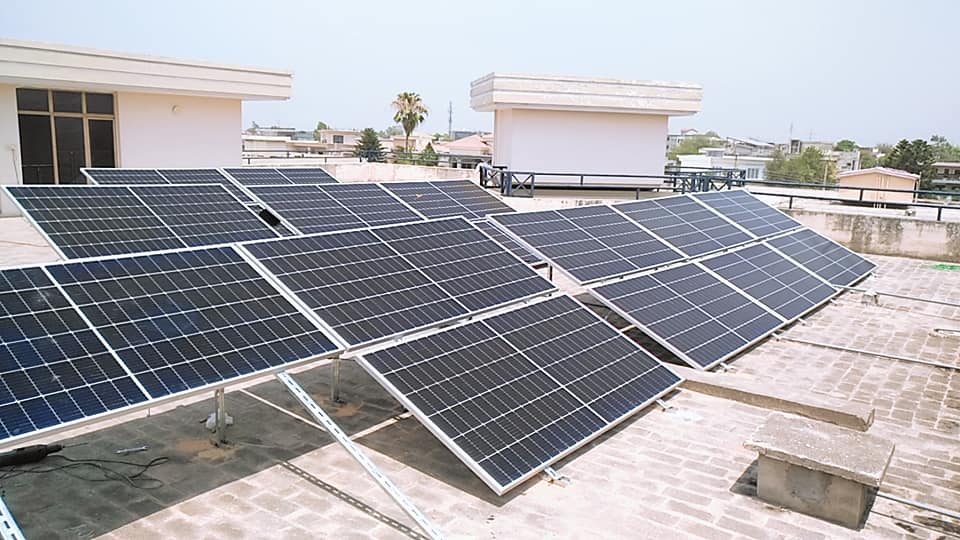
Grid Connection and Interconnection Costs
For on-grid and hybrid solar systems, the cost of connecting to the electricity grid and obtaining a net metering license can influence installation expenses. Similarly, there could be other costs as well, such as inspecting your rooftop through a licensed electrical inspector.
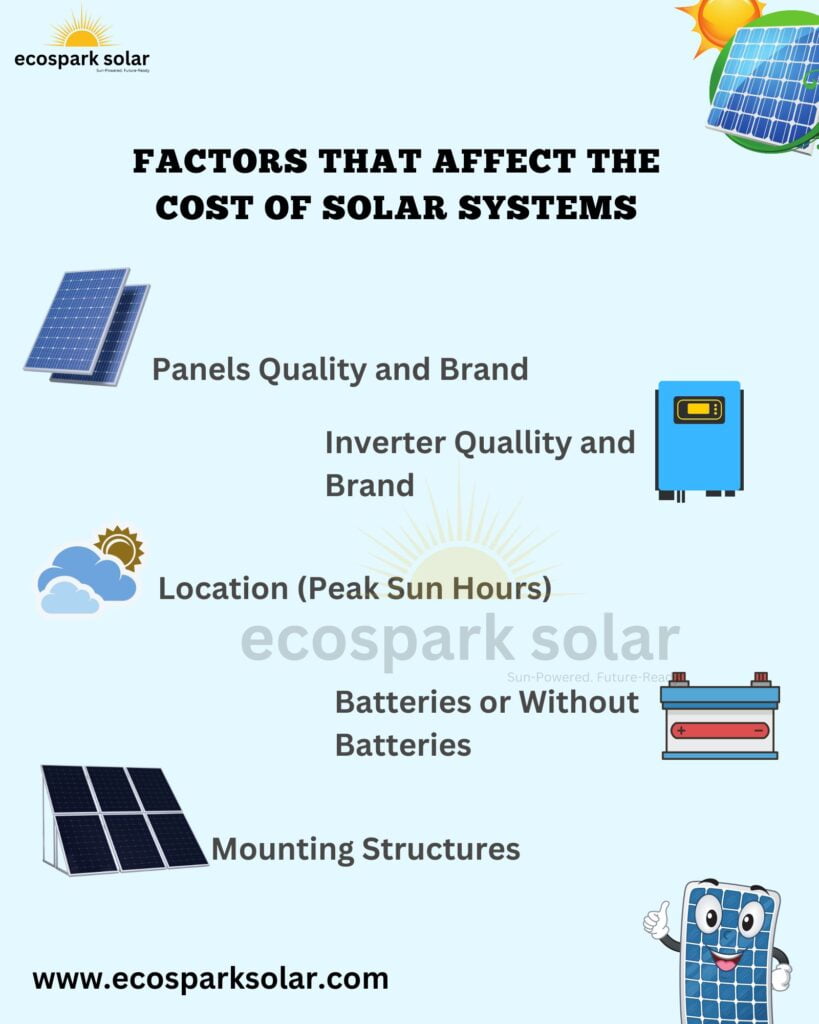
Payback Period of a 10kW Solar System in Pakistan
The solar payback period represents the time it takes for the savings generated by the solar system to match the initial investment cost.
Suppose you install a 10kW solar system in Pakistan for PKR 1,200,000. Over the years, the solar system yields approximately PKR 300,000 in annual savings on electricity bills—you will save through reduced reliance on the grid and potential energy export back to the grid.
To calculate the payback period, divide the initial investment cost by the annual savings:
Payback period = Initial Investment Cost / Annual Savings
Payback period = PKR 1,200,000 / PKR 300,000 Payback Period ≈ 4 years
In this example, the payback period for the 10kW solar system would be approximately 5 years. This means that after 5 years, the savings generated by the solar system will have covered the entire initial investment cost. Beyond this point, you will continue to enjoy reduced electricity expenses and potentially even generate surplus savings with no costs attached.
Frequently Asked Questions (FAQs) – 10kW Solar System in Pakistan
How many units does a 10kW solar system produce?
The energy production of a 10kW solar system depends on factors such as geographical location, sunlight availability, and system efficiency. On average, a 10kW solar system in Pakistan can generate approximately 40 to 50 units of electricity per day. Please note that this output may vary seasonally and throughout the year based on sunlight intensity.
How many solar panels do I need for 10 kW?
It depends. Technically, you need 20 panels of 500 watts each. Or 25 panels of 400 watts each. But if you want your system to generate the desired amount of electricity per month, your location would determine the number of panels needed. Say, you need 1500 units per month in Islamabad. Islamabad has 5.5 peak sun hours. That means one panel of 500 watts can produce 2.2 units per day and 66 units a month. Divide this by 1500, and you will have 23 panels needed for a 10kW solar system to generate 1,500 units a month.
If you want to know how we calculate this, read about how much power a single solar panel produces per day.
What’s the lifespan of a 10kW solar system?
A well-maintained 10kW solar system can last for about 25 to 30 years. During this period, solar panels may experience a gradual decline in efficiency, but they will continue to produce electricity. Inverters and other system components might require replacements or upgrades during the system’s lifespan to maintain optimal performance.
What’s the price of a 10kW solar system in Islamabad?
As of October 2024, the average price of a 10kW solar system in Islamabad falls within the range of PKR 1,100,000 to 1,800,000. However, please consider that this cost can be influenced by various factors, including the type and quality of solar panels, inverters used, mounting structure, installation complexity, and any applicable government incentives or subsidies. For a precise quote, we recommend contacting us, and we’ll guide you through the process step-by-step.
What’s the price of a 10kW solar system in Lahore?
As of October 2024, the average cost of a 10kW solar system in Lahore is approximately the same as in Islamabad, ranging from PKR 1,150,000 to 1,800,000. On-grid systems usually cost the least, while off-grid systems cost the most.
What’s the price of a 10kW solar system in Karachi?
The average price of a 10kW solar system in Karachi is approximately PKR 1,300,000 to 1,900,000 as of October 2024. While we do not have any experience working in Karachi, what I have learned while talking to customers reaching out to us that systems are a bit expensive in Karachi, especially towards the sea view side.
What’s the price of a 10kW solar system in Peshawar?
As of 2024, the average price of a 10kW solar system in Peshawar typically ranges from PKR 1,100,000 to 1,800,000.
10kW Solar System Price in Pakistan: Concluding Thoughts
10kW solar systems can cost homeowners and business owners from PKR 1,100,000 to 1,800,000. This is an average price and is influenced by the type of system, quality of components, location, and other factors. 10kW solar systems are one of the largest systems that can cater to medium-sized homes and businesses. Given the excellent payback period and potential savings, investing in a 10kW solar system is worth every penny.
I hope this article has helped you. If you want to go solar, contact us. We are customer-oriented and have a scientific approach toward solar. It’s all about you at Ecospark Solar!

